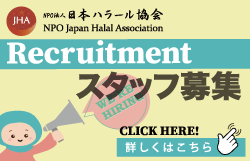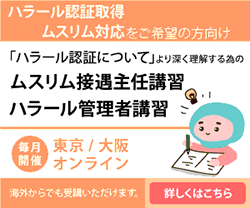Enhancing Halal in Japan – Towards our new mission directly to Muslims
Inbound tourism is accelerating these days, and there are bright signs for the inbound industry in Japan, such as a series of large international events scheduled in Japan. In addition, the demand for Halal and Muslim-friendly services in Japan is rapidly expanding due to the increase in foreigners working and studying in Japan and the increase in the number of Muslim households.
In the midst of this, we ,as Muslims ourselves have always felt that “It would be nice to have Muslim-friendly services in places like this,” and in addition, in accordance with our long-term desire to ‘Focus our efforts on areas directly contribute to the lives of Muslims’, we have renewed the food service-related certification system to make it easier for domestic food service operators and small and medium-sized businesses to obtain Halal certification in terms of cost and convenience.
1. [Halal certification services for domestic food and beverages]

- Halal Food Service Facility Certification:
For stores, facilities, and kitchens where the food is completely halal and no alcoholic beverages are served.
Examples of applicable facilities:
Restaurants, cafes, hotel kitchens, food trucks, cafeterias at schools and facilities, temporary kitchens at event venues, food stalls, etc.
- Muslim-friendly Food Service Facility Certification:
For establishments where the food is completely halal and alcoholic beverages are served. The only difference from the above halal restaurant certification is that alcoholic beverages are permissible to be served in the facility of this certification.
Examples of applicable facilities:
Restaurants, cafes, cafeterias at schools and facilities, etc., that include a dining area
- SME Manufacturer of F&B For Domestic Certification (small and medium-sized businesses only):
For small and medium-sized manufacturers that produce products for consumers such as frozen lunch boxes, frozen foods, processed meat products, bread, and sweets. This is limited to food and beverages for domestic consumption, so it does not apply to products intended for export, or products supplied as raw materials to companies that certify products for export, or to large companies.
The “Halal Certification Standard JHAS3001 for Domestic Food and Beverage Products” is different from the “Halal Certification Standard JHAS1002 for Products” which is for export overseas in accordance with the requirements of overseas certification and approval organizations. It is a minimum requirement that both businesses and consumers can feel comfortable dealing with Muslims in Japan.

2.[Procedure to obtain certification]
- Knowledge Acquisition: You will learn basic information about Islam and Halal, the certification process, etc. (We recommend taking the “Training for Food Service Facilities and Small and Medium-Sized Domestic Halal Food and Beverage Manufacturing Businesses (Monthly Online)” course.)
- Prior Inspection: We will review your documents and determine whether you can obtain certification.
- Main Application: If the prior Inspection determines that you can obtain certification, you can apply for the main application.
- Document Audit: Please submit documents based on the list of documents to be submitted.
- On-site Audit: An auditor will visit your facility and conduct an audit.
- Approval of the Decision Board: After the audit is completed and the decision is approved, a certificate will be issued.
Our Progress on Halal in Japan
The Japan Halal Association was originally established with the aim of “improving the food infrastructure in Japan.” 
However, since the wave of the “halal certification boom” hit Japan in 2013, our association, which was one of the first to establish mutual recognition with overseas countries, has been busy with certification audits for Japanese companies to export overseas, and has ended up spending most of its expenses, labor, and time on obtaining overseas approval and certification.
Meanwhile, looking back at the country, there are still few halal restaurants around us, and as for the procurement of Halal foodstuffs, it has become a little easier, but it is still difficult. Even international visitors are confused… the situation continues. And we came to realize that the development of domestic food infrastructure, what we were aiming has fallen far behind, and that our original goal has not been achieved yet.
Therefore, we started to brush up the prototype of the existing certification standard for domestic food services and improve it to make it easier to use. However, the most difficult point here was that what is good for consumers is not necessarily good for businesses. We had to strike a balance and create a standard that consumers would not be worried about. Also, since it is a certification standard, it has to be in a form that can be audited, that is, such as a request is made and an answer is given.
After repeated discussions with experts from our association and advice from external members, we finally completed this standard after more than two years and the cooperation of many people.
In this way, by using this certification standard, the possibility of obtaining certification will be greatly expanded for many businesses, including food service facilities of all types, including restaurants, and small and medium-sized souvenir manufacturers that are only targeted for domestic sales and domestic consumption, which were difficult to apply for under the previous certification standard.
By the way, if you don’t have Halal certification, are you not taking care of Muslims? Not at all.
There is a way to disclose the information Muslims want to know, so they can see it and decide for themselves whether or not to use take it. In addition to expressing the product in pictograms, the product is also clearly indicated as containing Halal meat or not, as well as not containing alcoholic beverages, etc., to provide a basis for making a decision themselves. On the other hand, the greatest benefit of halal certification is that it is a very effective tool for alleviating concerns at a glance.
The purpose of this new certification provided by our association is to popularize halal first and return its benefits to society as much as possible, so the costs associated with the certification have been set to the bare minimum.
Example of costs
For small businesses: Prior Inspection fee: 20,000 yen, Audit certification fee: 100,000 yen and up (excluding tax) *Transportation and accommodation fees for auditors are separate. Please contact us for details.
Let’s look back at the reasons why you might want to make your existing business Muslim-friendly.
1: We already have a lot of Muslim customers, but we want to see more in the future. We want to welcome customers in a proper manner.
2: We don’t currently have any Muslim customers, but we want to attract new customers in the future.
In either case, the primary goal is to increase customer numbers and increase sales. Therefore, keep in mind that making Muslim-friendly is part of marketing, and in that respect, you should decide whether or not your company should make Muslim-friendly and whether it is possible.
Since the goal is to increase sales, it is a problem if it costs too much, and it is also a problem if it becomes too much burden of work. However, on the other hand, as marketing, you are promoting and selling the fact that you are “Muslim-friendly,” so it should be something satisfies the customer and does not cause discomfort.
– Deepen your understanding by taking the seminar for food service facilities and small and medium-sized businesses that manufacture halal food and beverages for domestic use.
– I took the seminar, but I don’t know how to proceed afterwards. → Request an interview using the inquiry form and resolve your concerns.
– I have decided to accommodate Muslims within my company. → Let’s proceed to the application for halal certification for domestic food and beverages.
Our association’s halal certification for restaurants includes halal food service facility certification and Muslim-friendly food service facility certification.
On the other hand, there is a method of “information disclosure” rather than certification, that is, disclosing information about ingredients and seasonings used to give customers a choice. In the case of restaurants, since they can directly communicate information to customers (consumers), it may be sufficient to disclose information so that customers can decide whether to eat or not. “Information disclosure” is an effective method, especially for private stores that can respond to individual customers. However, for large stores and chain stores, it is difficult to “disclose information” to individual customers. Rather, if information about halal properties is presented in a way that can be understood at a glance, it is easy to convey the information, and in this case, “halal certification” can be said to be effective.
Also, the term “Muslim-friendly” can be used in various ways, therefore, you need to be careful.
Generally, when Muslims hear “Muslim-friendly,” they understand that it means “(Completely) Halal” in terms of food. On the other hand, in Japan, the term “Muslim-friendly” is sometimes used in cases where “only part of the menu is Halal” or “we made it with Muslims in mind”, which can lead to misunderstandings.
Our certification for Muslim-friendly food service facilities requires that “meals are halal only”. This is because we believe that it is difficult for restaurants that handle both non-halal and halal meat to ensure halalness by isolating and separating them in a limited space.
The purpose of our certification for restaurants is “for customers to use with peace of mind”. Of course, ease of use for the provider is also important.
In addition, the acceptable level of halalness varies from person to person, so creating an environment where both users and providers can receive and provide services with peace of mind leads to the provision of sustainable services. Therefore, it is necessary to focus on not compromising halalness, which is the biggest risk.
We understand that this is a common understanding between both parties, and we believe that the best way to achieve this is to create an environment where “only halal items are provided”. Although it takes some time, process, and effort, it ensures the “safety and security” that is the basis of the service.
If you are a business owner interested in the new certification, please feel free to contact us.





